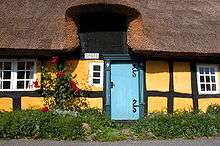Hygge

Hygge is a Danish and Norwegian word with a unique definition[1] (although very very similar to Gemütlichkeit). "Hygge" as a noun includes a feeling, a social atmosphere, and an action. The word is also used in compositions as "Julehygge" (Christmas-hygge). "Hygge" is also a verb e.g. "Lets hygge" and as an adjective e.g. "A small, hyggeligt house with grass on the roof".
The noun "Hygge" includes something nice, cozy, safe and known, but it should not be confused with the English, Dutch, German or Polish synonym. That word is more a physical state, instead the Danish and the Norwegian word focus on a psychological state.[2] "Hygge" is a state where all psychological needs are in balance. The antonym of hygge is uhyggelig, which translates as "scary".[3]
Collins English Dictionary named hygge the runner-up (after Brexit) as word of the year in UK in 2016.[4] This followed a period with quite a lot of books sent to the British market focusing on hygge.[5] Collins defines the word as "a concept, originating in Denmark, of creating cosy and convivial atmospheres that promote wellbeing".[4]
See also
References
- ↑ Interweavings – A cultural phenomenology of everyday consumption and social atmosphere within Danish middleclass families, Jeppe Trolle Linnet, 2010
- ↑ Hjalmar Falk og Alf Torp (1903): Etymologisk ordbog over det norske og det danske sprog. Aschehoug, Kristiania, s. 315
- ↑ https://web.archive.org/web/20161018181145/https://www.theguardian.com/world/2016/sep/04/hunting-for-hygge-a-new-ingredient-in-denmarks-recipe-for-happiness
- 1 2 "Top 10 Collins Word of the Year 2016". collinsdictionary.com. 2016-11-03. Retrieved 2016-11-07.
- ↑ Cartier-Morley, Jess (2016-10-18). "Hygge – a soothing balm for the traumas of 2016". The Guardian. Retrieved 2016-11-07.